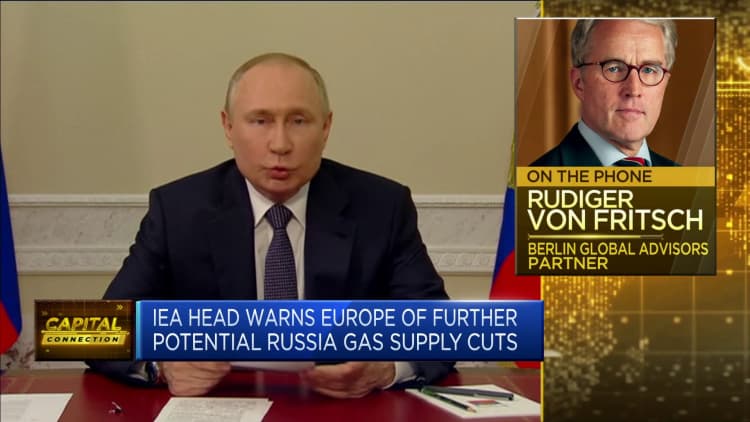Speculation is mounting that Russian President Vladimir Putin will use his annual address to Russian lawmakers Thursday to announce that Russian troops will be sent to “protect” the pro-Russian, breakaway region of Transnistria in Moldova.
Officials in the separatist region appealed to Russia on Wednesday for “protection” against Moldova’s pro-Western government. Russia’s Foreign Ministry responded by saying protecting that the interests of the residents of Transnistria — calling them “compatriots” — was one of Russia’s priorities and that it would carefully consider the request, the ministry told RIA Novosti.
Analysts said that Putin could now use his State of the Nation address — an overview of the current situation in the country, and Russia’s goals at home and abroad — to make an announcement about Transnistria, a region in eastern Moldova that Russia has backed since the collapse of the Soviet Union in late December, 1991.
“One signpost to watch this year is whether Putin makes any references to Transnistria, an internationally recognized part of Moldova which has been controlled by Russia since 1992,” Andrius Tursa, central and eastern Europe advisor at risk consultancy Teneo, said in a note this week.
The self-proclaimed pro-Russian authorities of Transnistria held a congress of senior officials Wednesday, at which they asked Moscow to implement measures to protect Transnistria — a region also known as Transdniestria or Pridnestrovie — and its economy against an alleged threat from Moldova, which has been aiming to reintegrate the region.
“There is social and economic pressure on Transdniestria, which directly contradicts European principles and approaches to the protection of human rights and free trade,” read the text of a resolution from the meeting, Reuters reported.
The document was addressed to Russia’s parliament, the Federal Assembly, asking it “to implement measures to protect Pridnestrovie [Transnistria] in the context of increasing pressure from Moldova,” news agency Tass reported.
The request, officials said, was made “taking into account the fact of permanent residence on the territory of the Pridnestrovian Moldavian Republic [the official name of Transnistria] of more than 220,000 Russian citizens and the unique positive experience of Russian peacekeeping on the Dniester, and also the status of a guarantor and mediator in the negotiation process,” the resolution said.
Moldova’s government dismissed the statement yesterday as “propaganda,” with a government spokesperson stating that “at this point, we want say clearly and firmly – there are no dangers of escalation and destabilization of the situation in the Transnistrian region of Moldova.”
“We keep a close eye and reiterate that the Transnistrian region is aligned with the goal of peace and security of Moldova. This is another propaganda event,” spokesperson Daniel Voda said.
The White House said it noted the development with U.S. State Department spokesperson Matthew Miller, stating on Wednesday that “Given Russia’s increasingly aggressive role in Europe, we are watching Russia’s actions in Transnistria and the broader situation there very closely.”
Concerns growing
While the self-proclaimed authorities of Transnistria have made similar calls in the past, the latest request, amid Russia’s ongoing invasion of Ukraine, is sure to heighten “concerns about Moscow’s broader territorial ambitions in Europe,” Tursa said in emailed comments on Tuesday.
“As a result, recurring rumors about Russia’s alleged plans to annex the region could be part of Moscow’s attempts to heighten political tensions in Moldova ahead of the pivotal autumn 2024 presidential election, which might be held along with a referendum on pursuing EU membership,” he noted.
Russia already has a small military presence in Transnistria and on Ukraine’s western border. No member of the United Nations (including Russia) recognizes Transnistria’s sovereignty, and all U.N. members consider the region to be part of Moldova, which has expressed a desire to reintegrate the region.
The latest call for help gives Russia a feasible excuse to reinforce those numbers, although it would be “extremely difficult” to do so, Tursa noted, because of its landlocked location.
It’s likely that Russia will justify the move by saying it is acting to protect its own citizens. The same tactic has been used in eastern Ukraine with support for pro-Russian separatists in Donetsk and Luhansk, and in the case of the Russian-backed breakaway regions of South Ossetia and Abkhazia in Georgia. Both of those cases led to, or involved, war.
“Transnistria is a focal point for Putin’s games, as he can easily escalate a crisis due to the presence of Russian troops and Russian citizens there,” Ivana Stradner, research fellow at the Washington-based Foundation for the Defense of Democracies think tank, said in emailed comments.
“Putin understands that as the West is distracted in Ukraine, the Middle East, elections in the EU and the U.S., he can escalate the Transnistria crisis via his proxies and show that the West will not protect Moldova.”
CNBC has contacted the Kremlin for a response to the comments and is awaiting a reply.

The move could also be a precursor to a referendum on joining the Russian Federation, analysts at the Institute for the Study of War said, or to Russian troops not only entering but annexing Transnistria, amid speculation that Russia wants its “land bridge” of occupied territory across a swathe of southern Ukraine to reach Transnistria.
So far, however, Russian forces do not occupy the whole of southern Ukraine, with Kherson, Mykolaiv and Odesa still in Ukrainian hands.
Similarly to Ukraine, both Moldova and Georgia have pro-Western governments and want to join the EU, meaning relations with Russia continue to be tense.
After Russia’s invasion of Ukraine, another former Soviet republic, there have been heightened concerns that Georgia and Moldova could be next on the list, given Putin’s apparent ambition to rebuild Russia’s sphere of influence and semblance of a Russian empire.
Any move by Russia to reinforce its military presence in Moldova could put it on a direct collision path with Moldova’s government and armed forces, potentially opening another front in Russia’s expansionist war.
Read the full article here




